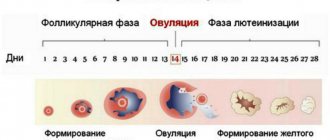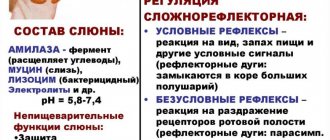The article was prepared by a specialist for informational purposes only. We urge you not to self-medicate. When the first symptoms appear, consult a doctor.
Vomiting after eating is not an independent pathology, but a symptom that something is wrong in the body. It can occur due to poisoning, diseases of the gastrointestinal tract, head injury, cancer and a number of other reasons.
Whatever the etiological factor, vomiting after eating is not a sign of health, and every person needs to understand what could have caused it.
Mechanisms of development of vomiting
The act of vomiting is usually divided into several stages - nausea, the urge to vomit and vomiting itself.
Nausea does not always precede the urge to vomit and is expressed in an unpleasant feeling localized in the throat and stomach. At the same time, the natural tension of the stomach muscles drops, and the small intestine begins to work more actively.
The urge to vomit is accompanied by a strong and frequent contraction of the muscles of the peritoneum and diaphragm. During the process of vomiting, the valve of the esophagus opens, and the food in the stomach rises up and then comes out.
At this time, the respiratory organs are blocked, which prevents the contents of the stomach from entering the bronchi and lungs.
As for the mechanisms of vomiting, there are two of them:
- From an organ or organ system, nerve impulses are transmitted to the vomiting center. Signals can be sent by the coronary arteries, gastrointestinal tract, vestibular apparatus, pharynx, etc.;
- Signal transmission can enter the vomiting center from the chemoreceptor trigger area, which is irritated for one reason or another. This may be due to the following factors: oxygen deprivation, taking medications, radiation therapy, infection of the body with pathogenic bacteria, etc.
Causes of vomiting after eating
Nausea and vomiting after eating are most often caused by pathologies of the gastrointestinal tract, although other etiological factors are also possible.
The causes of vomiting after eating can be the following:
- The presence of ulcers of the stomach, esophagus, intestines;
- Oncological diseases of the digestive system;
- Inflammation of the gallbladder and its ducts;
- Inflammation of the pancreas;
- Any mild brain injury (in other cases the person loses consciousness);
- Pathologies of the central nervous system (brain neoplasms);
- Food poisoning;
- Alcohol poisoning;
- Binge eating;
- The presence of too fatty foods in the menu in significant quantities;
- Emotional shock;
- Chronic fatigue.
With gastritis and stomach ulcers, vomiting will occur after eating. It is possible that a person has stenosis of the cardiac orifice of the stomach and pylorus. Stenosis of this part of the stomach can be caused by the presence of a tumor or chronic inflammation.
If the cause of vomiting is gallbladder pathology, then it can occur not only after completion of the act of eating, but also during this process. Pancreatitis, in turn, in addition to vomiting, is manifested by pain in the left hypochondrium and flatulence.
Injuries, tumors and infections of the brain can cause vomiting after eating, however, these pathologies are accompanied by a whole set of severe symptoms.
The vomiting center, which is located in the brain, can be irritated against the background of severe emotional stress, after experiencing excitement or with severe fatigue. Vomiting occurs after eating simply due to the fact that some contents appear in the stomach.
Symptoms requiring veterinary consultation
Vomiting of undigested food in a cat caused by overeating does not cause a deterioration in the pet’s general condition. After the attack, he feels well and continues to lead his usual lifestyle: playing, sleeping, walking.
In a situation where the reason that the fluffy is vomiting pieces of food is some kind of disease, then other pathological symptoms also appear. A purr must be shown to a veterinarian if it develops :
- weaknesses;
- signs of dehydration;
- loss of appetite;
- apathy.
The following signs indicate that the condition is particularly serious::
- Episodes of vomiting pieces of food become frequent, i.e. the pet vomits more than once or twice a day;
- in addition to food, the gastric contents contain impurities of bile, blood, mucus and others;
- vomiting continues even after the stomach is completely empty of food. The cat then vomits foam with various impurities;
- attacks are accompanied by other symptoms: aimless movement around the apartment, insomnia, lacrimation and others.
Single episodes of vomiting are not dangerous, but if the cat constantly vomits after eating or his condition worsens significantly due to attacks, then he needs to be shown to a veterinarian to clarify the diagnosis.
© shutterstock
Vomiting an hour after eating
Vomiting that occurs such a short time after eating can signal diseases of the gastrointestinal tract such as pancreatitis, cholecystitis, and cirrhosis of the liver. These pathologies are often accompanied by bloating, belching, and lack of appetite.
Vomiting and high body temperature
Sometimes, due to decreased immunity, a person may vomit after eating. But this requires a combination of several factors. For example, if a patient has an elevated body temperature and also has iron deficiency anemia, this can lead to increased blood pressure and vomiting.
Fever and vomiting after eating can be symptoms of food poisoning. Intestinal infection is characterized by similar manifestations, but it is always accompanied by diarrhea.
Prevention measures
In order to improve bowel function, you need to change your lifestyle. Unfortunately, drastic changes in old age are practically impossible, especially if his place of life is a nursing home for bedridden people or another similar institution. However, there are simple recommendations by following which older people can improve their well-being and prevent the development of diseases:
- It is advisable to drink water before meals. The same applies to any liquid. Otherwise, gastric juice will be washed into the lower intestines, which can lead to overload of the secretion apparatus and gastritis.
- After eating, you can drink no earlier than two and a half hours later. Otherwise, additional stress is created on the pancreas and liver.
- You can drink a glass of warm water in the morning. In some cases, it is recommended to mix the liquid with honey and lemon.
- Food must be chewed thoroughly, and if you have dental problems, it is not recommended to eat hard foods.
- Food should be at body temperature. There is also no need to eat unfamiliar foods in large quantities.
- Meals should be frequent and portions small. This relieves stress on the digestive organs.
- Raw vegetables, heavy flour or fried foods are contraindicated for older people, as they can provoke various diseases.
- If you experience abdominal pain, constipation or diarrhea, you should consult a doctor, since only a specialist will be able to make the correct diagnosis and prescribe appropriate treatment, taking into account the patient’s characteristics.
Vomiting immediately after eating
Vomiting that occurs within a few minutes of eating can be caused by overeating. In this case, enzymatic preparations, for example, Mezim, Festal, etc., can help.
Eating very fatty, spicy, fried and smoked foods can cause rapid vomiting. This is explained by the fact that the pancreas, stomach and liver could not cope with digesting such heavy food.
High blood pressure can also cause nausea and vomiting.
What to do at home if you vomit after drinking alcohol
When a person vomits, his body gets rid of toxins, so there is no point in fighting this process. To minimize the side effects associated with vomiting and hangovers in general, the following tips will help:
Smell of fumes
How to get rid of it at home: advice from doctors
Drink water or soda
But you need to drink it in small sips, waiting about 30 minutes after the last vomiting. Otherwise, the water will again trigger the gag reflex.
Soda in the morning is also a good option. Yes, it is not recommended to drink it with alcohol, since gases accelerate the absorption of alcohol into the blood, but for a hangover it’s just the thing. Carbonated water helps to quickly break down acetaldehyde, a toxic breakdown product of alcohol.
Eat a piece of ginger
It is a powerful antioxidant and relieves hangovers. In addition, it relieves symptoms such as nausea, vomiting and diarrhea.
Take Ibuprofen
If you feel sick and vomiting the next morning, take an Ibuprofen tablet - this is the most gentle drug for an exhausted body.
Aspirin also helps well in the morning, but in this situation it is better to avoid it - it irritates the stomach.
And under no circumstances take Paracetamol (by the way, it is also included in Citramon). This drug puts a very heavy load on the liver, which is already overloaded with alcohol.
Have breakfast
Light foods such as dry toast, crackers, potatoes or a banana will help the body recover.
But it is better to avoid foods that can irritate the stomach and are difficult for it to digest. These include fatty, fried or spicy foods, as well as milk and cheese.
How to get rid of a hangover
There are a number of simple methods at hand that doctors quite approve of.
Give up coffee
A cup of good, freshly brewed coffee beans helps to invigorate you, but at the same time it is a diuretic. And additional dehydration can strengthen the gag reflex.
Take a walk in the fresh air
A brisk walk in the fresh air will help you feel better. But don't overdo it with activity - sweating will lead to even greater dehydration and nausea.
Get some sleep
Sleep restores strength, so if possible, you need to sleep an extra 2 - 3 hours.
Vomiting with belching after eating
Belching often occurs due to excess air entering the stomach. This happens when a person eats food in a hurry, quickly chews and swallows food, or eats while talking. An additional risk factor is the consumption of carbonated drinks.
It is possible that belching and vomiting after eating are associated with the consumption of certain foods to which the body previously did not give such a reaction. For example, as people age, they often lose the ability to digest dairy products. This is especially true for whole milk.
Drinking strong coffee on an empty stomach can cause belching and vomiting. The same applies to drinking alcoholic beverages, mushrooms, and canned food.
Vomiting with heartburn after eating
Heartburn and vomiting after eating are symptoms of gastrointestinal pathology, the most common of which is an esophageal ulcer. Thus, increased heartburn will occur when a person lies or leans forward.
Heartburn is expressed in pressure in the epigastric region, nausea and a bitter taste in the mouth. Risk factors include snacking on the go, overeating, drinking alcohol, and taking medications.
Separately, it is worth noting wearing too tight clothes and obesity.
Vomiting of bile after eating
Vomiting with bile after eating is often explained by the fact that the pyloric valve does not cope with its functions and remains open. The causes of disruption in its work are alcohol intoxication, pyloric stenosis, chronic inflammatory processes in the gastrointestinal tract, central nervous system diseases, stress, circulatory disorders, and intestinal obstruction.
A separate condition that can lead to valve dysfunction is pregnancy. Therefore, during pregnancy, vomiting of bile may occur.
Causes of the disease
Eating disorders in adolescence can occur for several reasons:
- biological and psycho-emotional changes - dissatisfaction with one’s body, low self-esteem, family conflicts, dependence on the opinions of others;
- genetic eating disorders - various metabolic failures, impaired insulin tolerance when sudden drops in blood glucose cause uncontrollable hunger;
- influence of estradiol production (sex hormone in both women and men).
Parents may not always notice the onset of the disease, because the teenager hides his condition and his weight remains within normal limits. Seeking help usually occurs in later stages.
Vomiting blood after eating
The reasons why blood is present in the vomit may be as follows:
- Damage to the integrity of the mucous membrane of the stomach and esophagus;
- Varicose veins of the esophagus and stomach;
- Advanced peptic ulcer;
- Cirrhosis of the liver;
- Exacerbation of gastritis;
- Internal bleeding.
In childhood, blood may be present in the vomit after nosebleeds because the child has swallowed blood. Late toxicosis and high blood pressure can cause internal bleeding in pregnant women, causing them to vomit blood.
More details:
Vomiting blood
Literature:
- Current problems of deviant behavior of minors and youth: criminological and psychological aspects of metacriminology / A. Ya. Minin, O. Yu. Kraev; Ed. prof. A. Ya. Minina. - Moscow: Prometheus, 2016. - 140 p.
- Psychiatry of childhood and adolescence / [Bjarni Arngrimsson et al.]; edited by Christopher Gillberg and Lars Hellgren; under general ed. P. I. Sidorova; [transl. with Swedish Yu. M. Makkoveeva]. - M.: Geotar-Med, 2004. - 531 p.
- Addictology (Federal State Educational Standard of Higher Professional Education): an illustrated textbook for students of higher educational institutions of the humanities (all levels of training) / B. R. Mandel. — Moscow: DirectMEDIA, 2014. — 535 p.
Mucous vomiting after eating
If mucus is present in the vomit, this most often indicates food poisoning or toxic substances, or a bacterial intestinal infection. Mucus in the vomit appears due to excessive activity of the duodenum, which is subject to inflammation. It is possible that in addition to mucus, foam and blood will be present in the vomit.
Other reasons for the appearance of mucus in vomit are various pathologies of the gastrointestinal tract and stress factors. When mucous vomiting only bothers you in the morning, you can suspect chronic bronchitis, in which mucus accumulates in the bronchi during the night's rest, and comes out in the morning along with vomit with a strong cough.
Dizziness and vomiting after eating
Dizziness and vomiting can be caused by causes that are not dangerous to human health, including seasickness and motion sickness.
Other, more dangerous etiological factors for dizziness and vomiting after eating include:
- Meniere's disease with prolonged bouts of dizziness and vomiting, as well as hearing impairment;
- Vestibular neuritis. In addition to vomiting and dizziness, the patient experiences panic, congestion in the ears, loss of coordination and balance;
- Migraine. With this disease, vomiting and dizziness are combined with severe headaches. In addition, a person develops photophobia and suffers from balance;
- Hormonal changes in a woman's body. Vomiting and dizziness can be caused by pregnancy, menopause, or the next menstruation;
- Head injuries;
- Epilepsy.
Bulimia after eating
In some cases, a person can independently provoke the urge to vomit. Girls often do this in an effort to get rid of extra pounds. To do this, after the next meal, they induce vomiting. As a result, the brain, having received a signal of saturation, does not require more food, and body weight does not gain. But over time, the stomach gets used to this reaction and rejects any food, even in small quantities. This disease is called “bulimia” and poses a threat not only to health, but also to human life.
How to treat bulimia in teenagers
An eating disorder is successfully treated and does not arise in the future, since complex therapy is used to overcome it. In addition to the psychiatrist, the patient is examined by other specialists: gastroenterologist, cardiologist, dentist, dermatologist. Treatment consists of several stages:
- improvement of somatic and psychological state;
- normalization of diet and physical activity;
- changes in eating behavior;
To get rid of bouts of overeating, both medication and psychotherapy are used. Methods are selected individually depending on the characteristics of the patient.
- Behavioral (cognitive-behavioral) psychotherapy - for the formation of new eating habits. Helps get rid of worries about excess weight and eliminates bouts of overeating.
- Individual, group, family psychotherapy . Has a motivational character. Helps increase self-esteem, eliminates personal problems, and works on all aspects of life.
- Drug therapy. Antiemetics, antidepressants, selective serotonin reuptake inhibitors, and sedatives are used. Symptomatic prescriptions to eliminate the consequences of the disease.
Treatment of bulimia in adolescents has a favorable prognosis and ends with complete recovery when contacted by specialists.
Vomiting after eating in a child
The causes of vomiting after eating in children are similar to the reasons that provoke this symptom in adults. Separately, we can note congenital anomalies of the development of the gastrointestinal tract (pyloric stenosis, pylorospasm, etc.), difficult childbirth followed by hydrocephalus or high ICP, as well as physiological regurgitation, which does not pose a threat to the baby’s health and stops as he grows up.
If a person is bothered by vomiting after eating, then you should not self-medicate, but rather seek qualified medical help. A doctor who deals with the treatment of diseases of the gastrointestinal tract is a gastroenterologist, but it is possible that you will need the help of a neurologist, neurologist, therapist, oncologist or surgeon.
Author of the article:
Alekseeva Maria Yurievna |
Therapist Education: From 2010 to 2016 practicing physician at the therapeutic hospital of the central medical unit No. 21, the city of Elektrostal. Since 2016 he has been working at diagnostic center No. 3. Our authors
Content:
- Causes of the disease.
- Symptoms of bulimia in a teenager.
- Signs of bulimia in adolescents.
- How to treat bulimia in teenagers.
Bulimia (polyphagia, sitiomania, raphania) is a pathologically increased desire for food, gluttony. It manifests itself in bouts of gluttony, followed by a feeling of guilt and the expulsion of everything eaten with the help of vomiting or laxatives. Most often, bulimia develops in children 10–14 years old, mostly girls.









